Proper nutrition plays a significant role in taking care of a horse. Thus, you may wonder what horses like to eat and what horses can’t eat at all. Safe horse food includes grass, hay, grains, sweet potatoes, carrots, apples, berries, and many others. Keep reading to get the full list of dos and don’ts.
In fact, feeding a horse is a crucial part of their life. As they spend a lion’s share of their time grazing, chewing, swallowing, and digesting. That’s why horses have to consume loads of fiber in order to keep their tract working around the clock. Hence, they eat frequently but with little portions.
Lots of aspects affect the horse’s diet. Depending on your companion’s state of health, age, weight, purpose, etc, you should provide versatile feeding with a wide range of ingredients. Moreover, the way you treat your horse has a great impact on its overall physical well-being and mental health.

What Horses Can Eat
So what do horses like to eat? Horses are into snacks, grass, and hay. Apart from that, they love it when you treat them with yummies as fruits or vegetables, sugar cubes, grains, and so on. But don’t overdo it, as overfeeding may lead to colic and discomfort feelings. Not to spoil your little one, here’s a list of top-shelf products your horse will be obsessed with.
- Pasture grass. It’s a part of a natural diet, and it’s great if you have your cultivated pasture to graze. A quality pasture provides most of the nutrition needed. It’s recommended to contact a local agricultural office to get your spot checked for quality content.
- Hay. It’s a mix of cut and dried plants put together. It’s a great feed for horses as it provides healthy nutrition. Besides, the roughage hay helps to keep the digestive system up almost all the time. Another perk is that hay satisfies the natural urge to horse chewing.
- Hay cubes. Concentrated blocks of hay are called hay cubes. In addition, they are more budget-friendly than hay itself. That’s a great option for old and weak horses, as hay cubes are easier to chew.
- Fruit and Vegetables. “Juicy” products are also substantial in horse feeding. They are rich in fiber, vitamins, and minerals, as well as moisture the tract. But don’t give a large number of fruits or vegetables at one time. As this may lead to colic, overweight, or even more severe issues as laminitis.
- Salt. Apart from horse food, your horse should be provided with proper horse food supplements. A salt block is a great option to be set at a pasture. So your companion may have a treat at any time they graze around.
- Grains. Oats are the most common grain for a horse. However, some owners may include corn but in a small amount. On the contrary, wheat is not recommended for horses. Overeating with grains may lead to colic, so be careful with such a feed. Hence, grains shouldn’t be the main part of your horse’s nutrition.
- Concentrates. It’s a combo of various horse food supplements including grains, vitamins, minerals, bran, flaxseed, beet pulp, etc. There’s a wide array of options to purchase that have different ingredient compounds to any taste.
If you want to treat your horse, here’s a list of the best treats for horses that can be offered your little one. But still, watch the portions, it should be a treat, not a full meal.
| Oranges | Celery | Green beans |
| Tangerines | Pineapples | Peanuts |
| Pears | Mango | Peanut butter |
| Peaches | Lemons | Almonds |
| Plumps | Limes | Cashews |
| Watermelons | Grapefruits | Chia seeds |
| Melons | Strawberries | Sunflower seeds |
| Berries | Dates | Sesame seeds |
| Cherries | Raisins | Honey |
| Beets | Grapes | Molasses |
| Bananas | Lettuce | Apples |
| Apricots | Squash | Carrots |
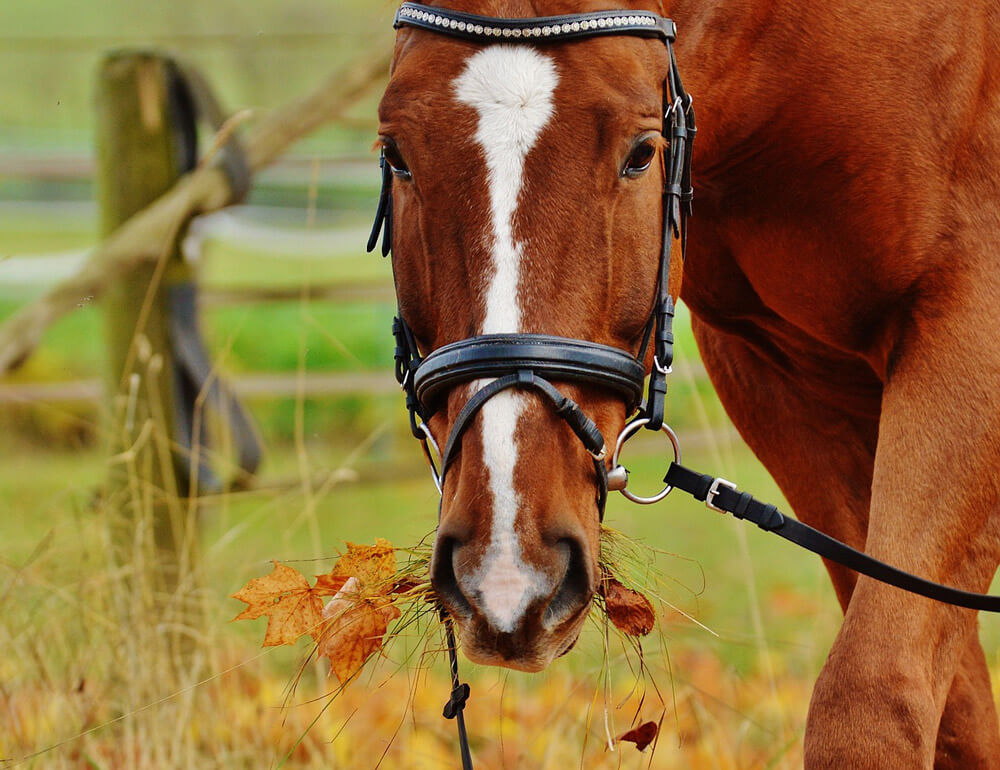
What Horses Can’t Eat
Apart from checking your horse feeding regime, you should make sure you don’t give anything that can bring your horse discomfort and health issues. Here’s a list of unsafe and unhealthy horse food.
| An excessive amount of fruits and vegetables | An excessive amount of bran | Broccoli |
| Stone fruits | Garlic | Cauliflower |
| Products with a high amount of sugar: cake, bread, chocolate, donuts, etc | Onions | Brussel sprouts |
| Potatoes | Dairy products: cheese, yogurt, etc | Avocado |
| Tomatoes | Meat | Rhubarb |
| Persimmons | Coffee | Sweet grains |
| Garden refuse | Alcohol | |
| Dusty hay | Cabbage |
Apart from that, when your horse is turned out, check the pasture to avoid plants toxic to horses. These may include Pokeweed, Alsike Clover, Horsenettle, Milkweed, Black Walnut, Horse Chestnut, and many others. Some of them are deemed as low-toxic, while others are extremely dangerous.

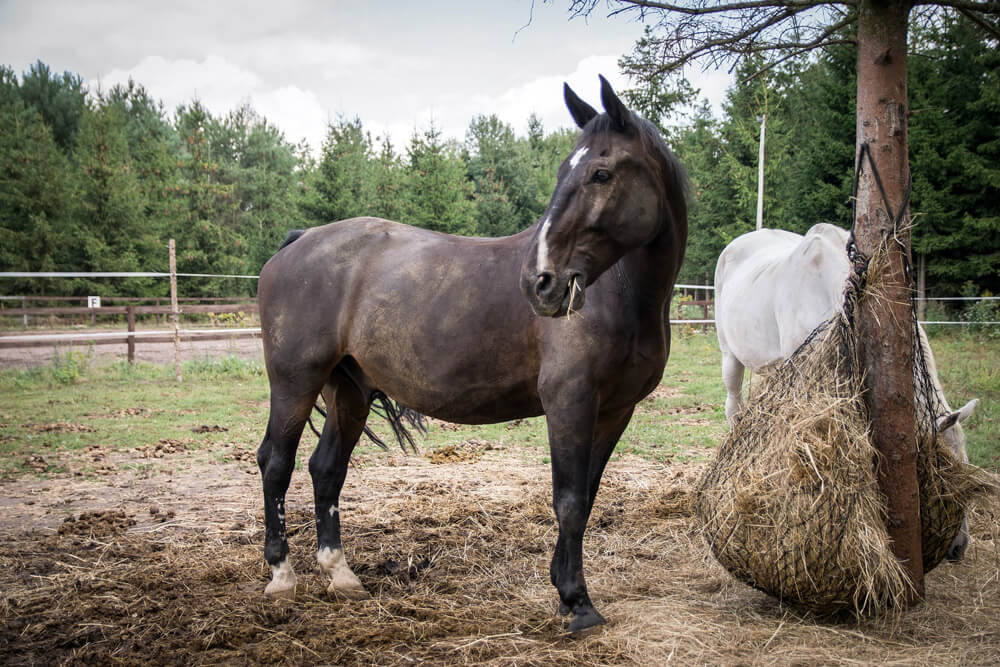
Can Horses Eat Cabbage?
It goes without saying that horses are fond of various fruit and vegetables. However, not every product is good for horses. Cabbage is referred to as the cruciferous family, including brussels sprouts and broccoli. It’s rich in raffinose (sugar) that is unhealthy for horses. Feeding your companion with cabbage may lead to gas discomfort and colic. Thus, cabbage is not recommended for horses.
Can Horses Eat Broccoli?
A little amount of fresh broccoli can be added to horse food but make sure your horse is not allergic to it.
Can Horses Eat Carrots?
One of the favorite treats for a horse is a carrot. This delicious stick is easy to grow and it’s full of useful elements, vitamin C, and vitamin A. You can treat your horse with carrots but don’t overdo it. One or two carrots is enough as a daily treat.
Can Horses Eat Peaches?
Yes, you can feed your horse with peaches. But keep in mind that their leaves are unsafe for horses, so it’s better to give your companion harvested fruits with pits removed in advance. Don’t overfeed your little one with fruits as it may result in colic.

Can Horses Eat Potatoes?
Horse owners avoid feeding their hooved friends with potatoes. This vegetable belongs to the perennial nightshade family, which is toxic for horses. A huge amount of alkaloids consumed by a horse may lead to its death. That’s why potatoes are prohibited for horses.
Can Horses Eat Bananas?
Actually, bananas are one of the best treats for horses that is tasty and nutritious. Besides, it’s rich in vitamin C and vitamin D, they are easily digestible. In small portions, bananas are safe for horses. One or two bananas per week should be enough for your companion.
Can Horses Eat Strawberries?
As we mentioned before, most fruits are healthy for horses, and strawberries are not an exception (yes, strawberry is a fruit!). They contain much antioxidant, magnesium, as well as vitamins C, K, and E. Feed your horse with fresh strawberries, not cooked or dried.
Can Horses Eat Blueberries?
Blueberries are another great treat for horses as strawberries. That’s a top-notch source of vitamins A, C, and antioxidants. As they contain a decent amount of sugar (15 grams per one cup), don’t overfeed your little one with such a fruit.
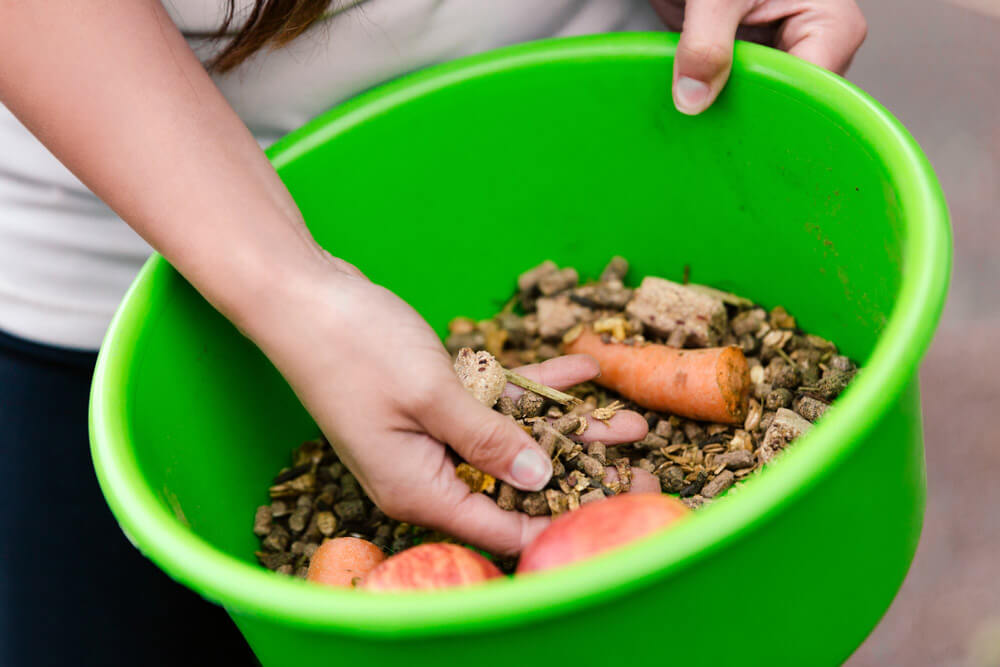
Can Horses Eat Peanut Butter?
In fact, horses are huge fans of peanut butter. This food is safe for horses, however, still not recommended. As peanut butter contains lots of sugar, it may lead to obesity. Therefore, you can treat your hooved friend with peanut butter, but not on an ongoing basis.
Can Horses Eat Grapes?
Grapes are a good treat for horses as they are rich in fiber. Apart from that, this juicy berry helps to regulate hydration, especially in hot weather. It’s recommended to feed a horse with up to 20 grapes per week, no more.
Can Horses Eat Chocolate?
People do love chocolate, but that doesn’t mean you should feed your horse with chocolate too. As it contains theobromine and caffeine, which are unhealthy for horses. Besides, a huge portion of sugar badly affects the digestion process. The same goes for cakes, cookies, chocolate chips, and other related stuff.
Can Horses Eat Apples?
Apples are claimed as the best treat for horses due to its variety of flavors and “hardness”. Apart from that, apples are rich in fiber, vitamin A and C. But again, mind the portions given to your companion. It’s better to cut the fruit into slices before feeding.

Can Horses Eat Bread?
Some horses treat their little friends with sandwiches, so is it ok? In fact, bread is safe for horses. It contains wheat that can bring vitamins A, D, and E, and zinc into your horse’s meal. However, it’s not recommended to feed your horse with bread regularly, as it’s not so nutritious and may add extra weight to the horse.
Can Horses Eat Corn?
Corn is a budget-friendly treat for horses that is available in all seasons. Still, it’s more popular to mix it with other grains to reduce the level of starch contained in corn. Feed your companion with a small amount of corn in order to regulate the glucose level in blood. 4 pounds of corn per meal is enough for an average 1000-pound horse.
Can Horses Eat Pineapple?
Pineapple is another juicy treat for horses that are totally safe. The fruit is rich in vitamin C, which is beneficial. Before feeding, don’t forget to peel the skin off and then cut the treat in small pieces. Therefore, a few slices of pineapple is fine for horses.
Can Horses Eat Honey?
Honey is safe for horses and feeding a horse with honey may be beneficial. It helps the digestion process, it restores energy, provides plenty of vitamins and minerals. Nevertheless, honey contains 17 grams of sugar per one tablespoon, so treat your horse wisely with such yummy.

Horse Biscuits
If chocolate is not recommended for horses, so is there a way out? Yes, you can make horse biscuits that are healthy and safe for your little hooves. There’s a gazillion of horse cookie recipes you can try on your own.

Do Horses Eat Meat?
Horses are grasped as herbivores, but more precisely, opportunistic carnivores. This is a category of animals that can eat meat (to survive if needed), but they don’t need to consume it as a regular meal.
Thus, horses may try meat (even just of being curious), but meat doesn’t provide enough vital nutrition for them. That’s why, it’s recommended to feed your horse with plant-based meals, containing horse foods described above.
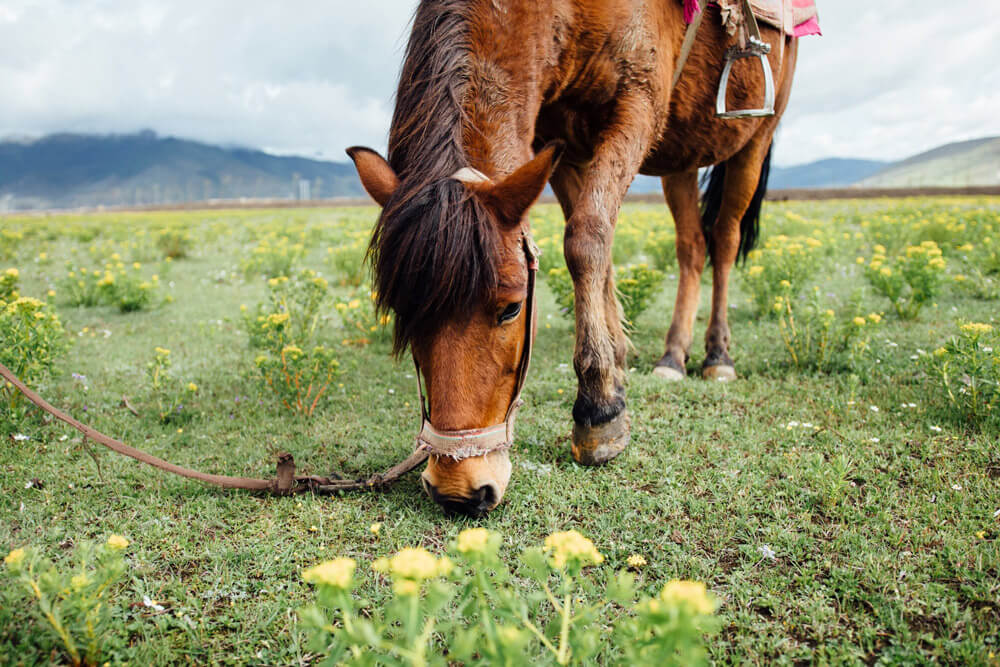
How Much Should a Horse Eat?
As a matter of fact, the proper amount of food to be given depends on many factors. Whether your horse is driven, young, healthy, etc, different nutrition should take place. Generally, the average daily feed weighs 1.5-3% of the horse’s body weight.
Make sure hay is the major part of your companion’s mealtime. At least half of the nutrition should be provided with pasture grass, hay, or hay cubes. If your horse trains a lot, it’s likely to need more food. But don’t saddle up a horse to ride it right after its feeding, as it may end up with colic and digestion issues.
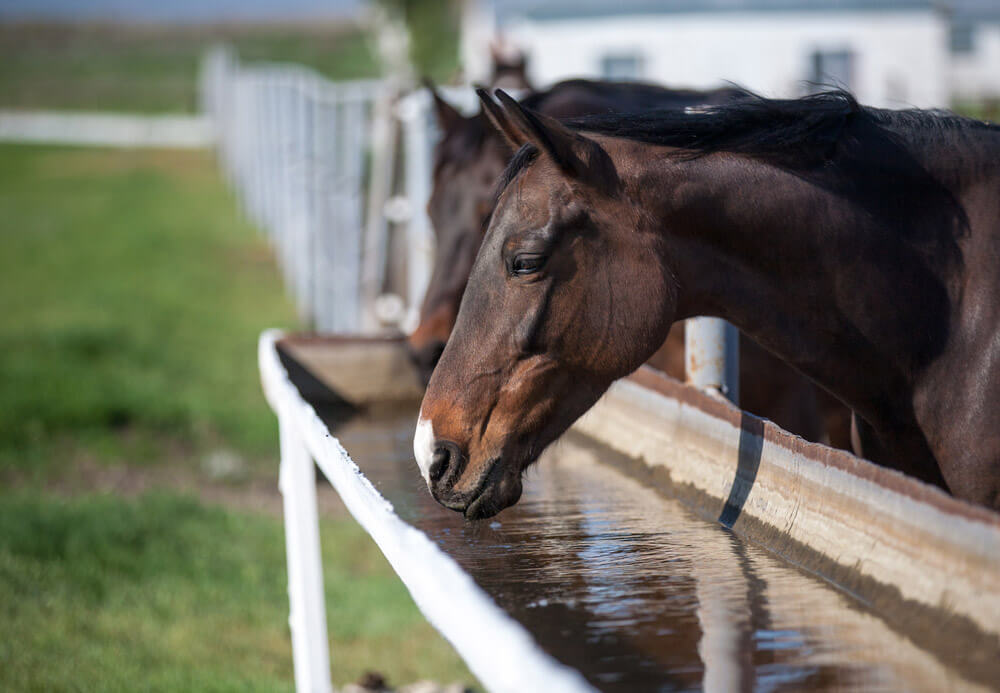
A Few Words About Water
Watering a horse also plays a vital role in daily care. Fresh water has to be available for your companion perpetually. Proper watering encourages digestion and hence, provides healthy feeding. In fact, an average adult horse may drink up to 5 or 10 gallons of water a day. If your horse frequently takes part in equestrian activities, it may get thirsty faster.
Those who live in a cold climate, you may struggle from water turning into ice. In that case, you can set up a heating system that fosters your horse to drink duly. Watch the horse waterers, perhaps you’ll need to break the ice from time to time.

Final Thoughts About Horse Food
When you own a horse, proper nutrition is at the top of the agenda. You should be aware of healthy and unsafe foods to pick out the best goods only. Lots of products can be deemed as a horse treat, but what they truly are? Check out this feeding guide to answer the question: “What do horses like to eat?”. So do you give the right food to your buddy?
By the way, by feeding your horse wisely, you encourage its temperature regulation, which is crucial in winter. If you need extra heating for your companion at a stable or outside, you may consider buying a horse blanket.
